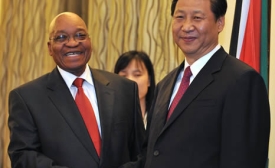china
Fake social media accounts are spreading pro-Chinese propaganda on Twitter, disseminating upbeat news stories about the troubled regions of Tibet and Xinjiang, according to an investigation by advocacy group Free Tibet.
While Castillo is not a diplomat, the gregarious restaurateur has made Caribeno a cultural outpost for his country. Chinese and expats come not only for the food but the lively music and the recently organized Friday-night salsa performances. Photos on the wall include ambassadors and entrepreneurs from many Latin countries, as well as scenes of Havana life, Caribbean beaches and icons like Che Guevara, who looks across the restaurant from an enlarged print of a Cuban 3-peso bill.
It's North Korean Supreme Leader Kim Jong-un as the world has never seen him. In a three-minute clip that has accumulated over 200,000 views after its early July posting on Chinese video site Tudou, a crudely photoshopped Kim dances on the street, on a baseball diamond, and in a cornfield, at various moments accompanied by Barack Obama or Osama bin Laden.
China’s increasing involvement in Africa has captured considerable attention from policymakers and academics. Formalized in a 2006 policy statement, “China’s Africa Policy,” Beijing’s interest in the region translates into Chinese government and government-affiliated institutions investing billions of dollars in large-scale construction projects across the continent.

A review of Howard French's book: China’s Second Continent: How a Million Migrants Are Building a New Empire in Africa.
Countries join alliances, or entities such as the European Union, because these groups make the benefits and obligations of membership as unambiguous as anything in international relations can be. For Germany and South Korea, however, relationships with historic allies — NATO and the United States, respectively — appear to be changing before our eyes.
China’s military will take part in an infantry exercise for the first time with Australian and US forces in October, the Pentagon said on Thursday. The joint exercise will take place in northern Australia and marks another step forward in efforts by Washington and Canberra to bolster relations with China’s People’s Liberation Army, officials said.
China's foreign ministry has condemned the behaviour of some Chinese citizens in Africa following its ambassador to Tanzania giving an uncommonly frank newspaper interview in which he decried the "bad habits" of his compatriots. In the interview, Lu Xinsheng said Chinese businessmen smuggle ivory and rhino horns out of the country and flood local markets with counterfeit goods while contractors constantly try to undercut each other, resulting in shoddy infrastructure projects.







